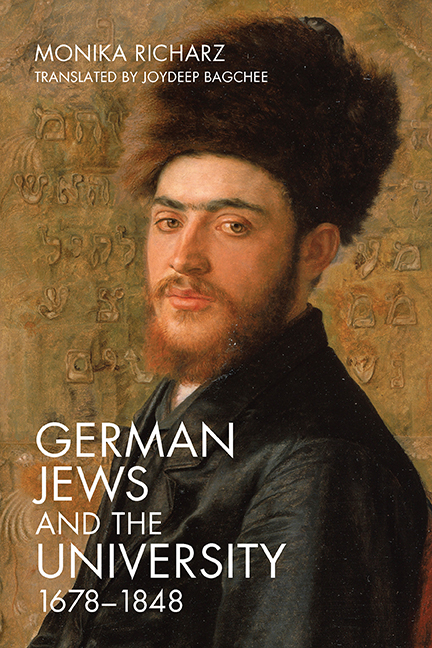Book contents
- Frontmatter
- Dedication
- Contents
- Foreword to the English Edition
- Foreword to the German Edition
- Preface to the German Edition
- Translator’s Note
- List of Abbreviations
- 1 Jewish Education in the Enlightenment Era
- 2 Jewish Encounters with the University before Emancipation
- 3 Jewish Students in the First Half of the Nineteenth Century
- 4 The Social Situation of Jewish Students in the pre-1848 Era
- 5 The Professional Experience of Jewish University Graduates
- Conclusion
- Documents
- Bibliography
- Index
Conclusion
Published online by Cambridge University Press: 15 September 2022
- Frontmatter
- Dedication
- Contents
- Foreword to the English Edition
- Foreword to the German Edition
- Preface to the German Edition
- Translator’s Note
- List of Abbreviations
- 1 Jewish Education in the Enlightenment Era
- 2 Jewish Encounters with the University before Emancipation
- 3 Jewish Students in the First Half of the Nineteenth Century
- 4 The Social Situation of Jewish Students in the pre-1848 Era
- 5 The Professional Experience of Jewish University Graduates
- Conclusion
- Documents
- Bibliography
- Index
Summary
IF ONE REVIEWS the task and position of Jewish university graduates over the 170 years dealt with here, this period appears as an epoch of the profoundest transformations and crises for them—more so than for other Jews. The position of the few academically trained doctors had been relatively clear and secure until Mendelssohn's time. Regardless of whether they had studied in Italy, Germany, or the Netherlands, as community doctors educated in the natural sciences and in the Talmud, they held positions of respect in the large Jewish communities. Insofar as they had not only a knowledge of practical and theoretical medicine but also a profound knowledge of the Talmud, they shared in the respect that Talmudic scholarship evoked in traditional Jewish society. As doctors to the poor in the employ of their communities, they discharged the community's religious obligation to sustain its members and, in addition, earned aboveaverage incomes from private practice and the sale of remedies that was permitted them. In addition to their medical functions, they often took on other community offices and, thanks to their study and their professional practice, even had contact to a limited extent with scholars and representatives of courtly society. In an intellectual respect, individual doctors played a role in relaying extra-Jewish knowledge to Jews and hence became bearers of the incipient Enlightenment movement within Jewry. From a social perspective, however, their situation fundamentally remained that of all Jews: as protected Jews, who were only tolerated, they lived outside of estate-based society.
The intellectual and social situation of Jewish university graduates changed in the second half of the eighteenth century, on the “eve” of the emancipation movement that had set in from France, even as their constitutional status remained the same. We can see that their number in the medical profession increased dramatically as did their professional and social contact with the non-Jewish world. The Enlightenment movement both within and outside of the Jewish world decisively transformed the intellectual and sociocultural relationships of Jewish university graduates with the outside world and improved the social status of “cultured” Jews, that is, individuals acquainted with extra-Jewish culture.
- Type
- Chapter
- Information
- German Jews and the University, 1678-1848 , pp. 239 - 244Publisher: Boydell & BrewerPrint publication year: 2022



